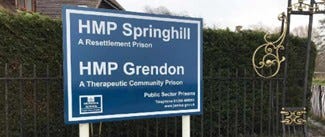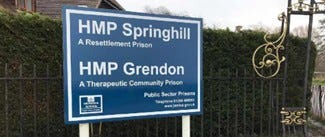Spring Hill is a men’s open prison in the village of Grendon Underwood, Buckinghamshire. It is jointly managed with Grendon Prison, which is on the same site. Originally known as Grendon Hall, the building was constructed in 1872 as a family home. During the Second World War the site was initially used as a base for MI6, and was then a training centre for the Special Operations Executive. After the war the site was converted by the Prison Service, and became the first open prison in the United Kingdom in 1953.
I had been trying to visit this prison (again) for some months, and, working with Patient Engagement LeadMichaela McAdam, we finally managed to make it happen. Sometimes prisons seem to put up barriers to progress for reasons I fail to either understand or in some cases accept, but we got around the fact that the prison couldn’t seem to host my visit in normal working hours. We got around this wall when I agreed to visit in the evening and to give up our time to run a chess session.
I should state again that it is people like Michaela who make chess happen in prisons; without their dedication and passion to help rehabilitate prisoners we would be in an even worse state than the prison education system currently is. But enough politicking – how did it go?
We had a window of 5-8 pm, and chess boards were neatly laid out in a small ‘hut’ with an open-door policy for prisoners to arrive as and when they wished. As a Cat D prison, inmates are trusted to move about parts of the site. During the course of the evening I played pretty much all the men who turned up. The playing standards varied, as it does in any group, but one or two were particularly good and gave me tough games. Two of the inmates brought notebooks along to write down any hints or tips, and I answered plenty of chess questions as the evening went on. Again, a stand-out misconception was the 50-move rule, with the men believing that it was 24 moves. They were stunned to learn that it was 50.
Also in their games on the wing they elected to ignore the en passant and touch move rules, so I simply told them that the laws of the game should always be applied in chess, because for one thing it is good practice. I have yet to see two football teams agree not to have the ‘penalties’ rule in a game. True, if both players agree the rules at the beginning that’s fine, but we need to be familiar with and apply the rules of chess. That’s my default position - that we cannot ignore a rule just because we don’t like it. I did mention that FIDE, the governing body of chess, referred to them as laws rather than rules, just for the record.
One wag jokingly mentioned that prisoners don’t like laws!
I noted that the majority opened with 1.d4 and opted for closed games, which was unusual as most players like 1.e4 and attack. The London System was very evident! Further tips for improvement were to try to castle early, or at least castle at some point. Kings were left in the centre of the battlefield too often, and they paid a heavy price. Finally the number 1 way that they - and indeed anyone – can improve is to move more slowly. The longer you think, the more options you will find. The old rule ‘When you find a good move STOP and find a better one’ really does ring true.
I must remark that yet again no prisoner asked for a move back. Once they had made their move they were resolute about sticking to it, even when it cost them. This is something not always seen on the outside, and it is to their eternal credit that they insisted on sticking by their decisions, good or bad.
I was reminded again how many prisoners would make excellent club members around the country. Some of them would easily slot into league teams, and they clearly study the game.
The men enjoyed their battles, switching opponents after each game, and they were in high spirits as they all immersed themselves in the royal game. They were definitely keen to meet more regularly, and I said that I would return if they showed an appetite for this. I donated a copy of my book Chess Behind Bars to the prison library, and also a chess set and roll-up board. Two beginners turned up, and I have convinced one of the stronger players to teach them the moves of the game and bring them along to the chess club, if indeed it does meet more regularly.
They do want to play more, and they even have a large outdoor chess set on the grounds, so a summer event is a certainty. I drove home in the dark winter chill very satisfied with how the evening had unfolded. Once again chess was the winner, bringing people together and building social relationships which might otherwise not occur.
My thanks are due to the governor and staff who supported the event, and to Michaela for taking the lead. Credit also to the prisoners who turned up. It is, after all, something set up exclusively for them, and I do draw their attention to how chess can truly help with mindful thinking and with life on the outside.
Finally, I appreciate the support that the English Chess Federation gives me for doing this work.




